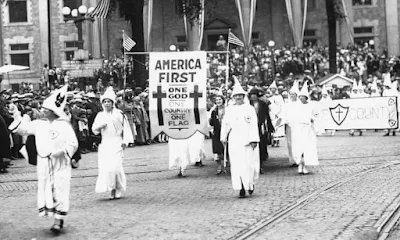What does it truly mean for a country to be great? Is greatness defined by military power, economic strength, or political influence? Perhaps. But for America, greatness has always been tied to its principles of diversity, tolerance, and democracy. America itself is founded by immigrants—people from all corners of the world who brought their cultures, traditions, and skills to this land. Over time, it wasn’t just the immigrants who contributed to America’s greatness, but also the countless African Americans who helped build the country, fought in wars, and shaped its identity. From laborers to scientists, soldiers, and even generals, African Americans played a crucial role in establishing the U.S. as a global power. Immigrants and African Americans have shaped America’s economy, enriched its culture, and even given their lives for its defense. So, can America remain great if it turns its back on those who helped build it?
In the last few years, we've seen figures like Donald Trump and Elon Musk push the idea of "America First." At first glance, the concept may sound appealing. After all, shouldn’t a country prioritize its own interests? In a sense, yes—every nation has the right to protect its citizens and put its own needs at the forefront. However, the way this philosophy is being implemented under Trump and Musk is concerning. America First in their vision often means America alone. It involves isolation, selfishness, and policies that not only exclude others but harm those who have long been part of the fabric of American society. Whether it’s the deportation of immigrants, the rhetoric around racism, or an unwillingness to engage diplomatically with the rest of the world, the idea of making America great is being twisted into a narrow, self-centered approach. Can a country really be great if it refuses to engage with the world, if it alienates the very people who helped shape its greatness?
The far-right policies championed by figures like Trump and Musk have led to some truly alarming ideas about how to govern. Their approach seems to lack any consideration for the long-term consequences of these actions. How is it in America’s best interest to cut ties with its allies? How does ignoring the world’s challenges help America? By blindly enforcing far-right ideas, they risk losing the very essence of what made America great in the first place: its openness, its collaboration, its leadership on the world stage. Instead of promoting innovation and global cooperation, we’re seeing the rise of policies that foster division and intolerance. It’s almost as if America’s greatness is now being defined by how isolated it can become.
One of the most significant consequences of the “America First” mentality is the cutting of aid to other countries—a decision that diminishes America’s ability to influence global events. By slashing funding for foreign aid and international organizations, America is not only abandoning its humanitarian responsibilities but also losing the leverage it once had to shape international diplomacy. These cuts send a message that the U.S. is no longer interested in helping others or leading by example. It creates a vacuum that adversaries like China and Russia are more than happy to fill. Can America truly remain a world leader if it is no longer a source of aid, peace, or progress?
These cuts also tarnish America's global image. In the past, the U.S. was seen as a defender of freedom, democracy, and human rights. But now? How can America maintain that image when it turns its back on countries in need? The decision to reduce foreign aid isn’t just an economic one—it’s a political and moral statement. By cutting funding to essential programs, America is reducing its ability to lead by example and build the partnerships that help foster peace and stability. It’s not just about losing power; it’s about losing respect. How can America claim to be a force for good in the world if it abandons the very principles that made it great?
America’s future greatness isn’t just about being powerful or prosperous; it’s about being a force for positive change, both at home and abroad. Selfishness and isolation will only bring about short-term gains, if any. Long-term greatness requires collaboration, innovation, and understanding. It requires the recognition that America’s success has always been intertwined with the success of the world at large. In today’s interconnected world, it’s impossible to thrive by shutting others out. America’s greatness lies not in its ability to stand alone, but in its capacity to lead and work with others to solve the world’s most pressing issues.
So, what does it mean for America to be truly great? Is it about standing above the world, refusing to engage, and prioritizing one’s own interests at all costs? Or is greatness about working together, embracing diversity, and using America’s strength to make the world a better place for everyone? The path to greatness lies not in narrowing our vision, but in expanding it to recognize the global community we are a part of.
Will America remain great if it turns its back on the world? Or is true greatness found in leading the charge for global cooperation, compassion, and progress? The choice is America’s to make—but one thing is certain: America First isn’t the road to greatness if it means turning its back on everything that made it strong in the first place.


Comments
Post a Comment